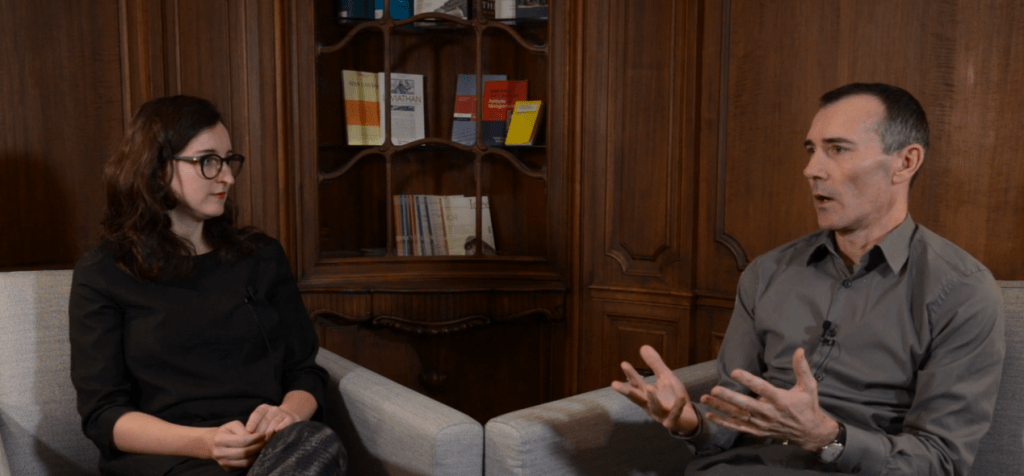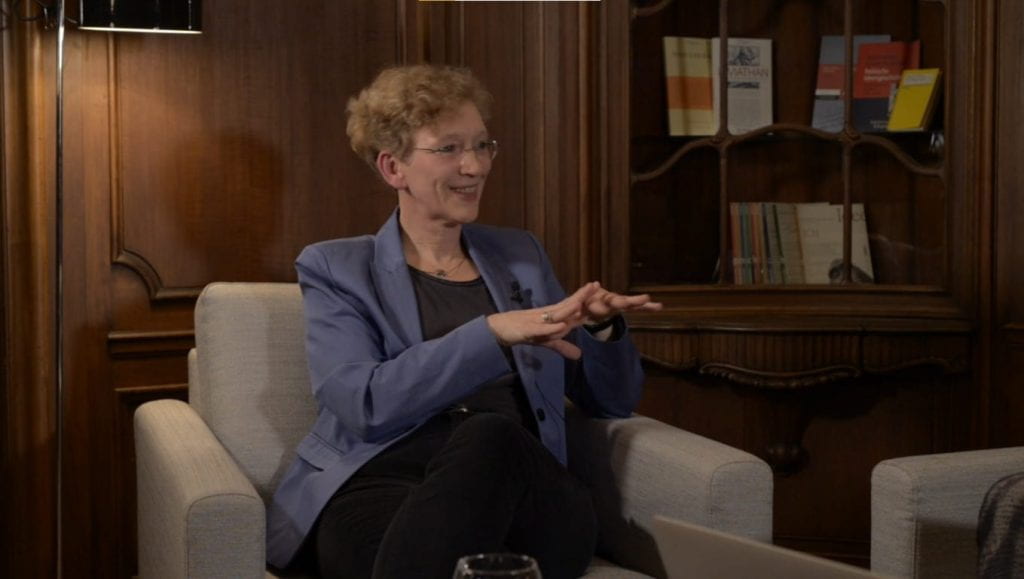This is the second installment of a two-part interview about the film Rosenöl und Deutscher Geist: The Fortunes of German Intellectual History by Richard Bourke (Cambridge) and Dina Gusejnova (LSE). For the first installment, see here.
Jonas Knatz & Anne Schult: Deportations and forced emigration from the 1930s onward entailed a rapid decline of intellectual history and its methods within German academia; yet, parts of this intellectual tradition quickly found a new home abroad, specifically in the US. Some of Meinecke’s students, such as Felix Gilbert, but also others like Werner Jaeger, Erwin Panofsky, and George Mosse were crucial for the establishment of the American history of ideas. In this sense, the history of Geistesgeschichte is not a purely German but rather a transatlantic one. To what extent is US intellectual history, and its trajectory over the second half of the 20th century, indebted to a specifically German approach?
Richard Bourke: The US historical establishment is massively indebted to the impact of German ideas, both under the influence of Meinecke’s students and more generally as a result of the sheer power of German thought. You cite the examples of Gilbert, Panofsky and Mosse. One might also mention Lovejoy, Hughes, Schorske, Krieger, Gay, Iggers, Jay and Toews. The question is to what extent this tradition has been advanced (or derailed) by a succession of intellectual “turns”—respectively dubbed linguistic, postmodern, and postcolonial.
Hayden White, Lynn Hunt and Dominic La Capra practised the history of ideas under the influence of assorted currents of French intellectual life. Since the 1970s, the impact of Michel Foucault has been considerable, as, more generally, was la pensée soixante-huit. Heidegger (and, to a lesser extent, Marcuse and Adorno) had a substantial impact on the character of the latter. Despite the enduring authority of Alexandre Kojève and Jean Hippolyte, the younger generation in France turned violently against Hegel, associating alleged teleological elements in his thought with the totalitarian politics of the 1930s—and, more parochially, with strands of Marxism that culminated in the French Communist Party.
Altérité, différance, and micropolitique were pitted against the aspiration to “totality.” Following the identification of rationality with “violence”—usually meaning coercive forms of occidental universalism—the West along with its culture fell under suspicion. As this cocktail of ideas mixed with debates about gender and race in the US, identity politics rose to prominence on university campuses, convicting past canons of thought of various forms of complicity with oppression. While sweeping verdicts of the kind gained ascendancy, intellectual history was met with misgivings to the extent that it was associated with its roots in Geistesgeschichte. Even its self-proclaimed cosmopolitan ambitions fell under the hermeneutics of suspicion: this, it was claimed, was a mere ruse for the goal of hegemony.
In a historically immigrant society scarred by the legacies of slavery, criticism began to focus on “exclusion” from dominant norms, symbolized by the existence of a Western canon of texts. The rising currency enjoyed by “history from below” helped to brand the history of philosophy as a kind of elitism. There is some irony in the fact that these amorphous indictments were launched under the influence of an alternative (no less canonical) body of writings. Conspicuous besides Heidegger were arguments extracted from Nietzsche and Freud, with Marx retaining at least symbolic capital in the process of arraignment.
Altogether, tools originally deployed to challenge and expose the philosophical foundations of Lutheranism were inchoately turned against the dominance of Western ideals in US universities. In all this the traditions of German thought were conscripted by the prosecution—often convicting German ideas among their opponents. If intellectual history was substantially a German bequest, elements of the same body of thought have been subtly abetting what looks like its demise.

Dina Gusejnova: I wanted to follow up on two points here—the transatlantic theme, and the “German approach.” In a recent discussion of the film, Emily Levine perceptively pointed out that the transatlantic story was not monodirectional. In fact, there were also many cases of reverse influence which are not touched upon in the film. To continue this line of thought, if we wanted to study the history of intellectual history in Germany more comprehensively, we would have to go into more detail about the paths through which ideas and intellectual traditions crossed the Atlantic. We examine the nature of this influence through a look at intellectuals who are themselves also historians of thought. They produce key books which transmit an idea of a tradition to new and multi-disciplinary audiences. I am thinking here particularly of Martin Jay’s group portrait of the Frankfurt School, The Dialectical Imagination, but I should also refer to Raymond Geuss’ The Idea of a Critical Theory. For Geuss and his work in American contexts, in addition to Critical Theory which influenced him in 1960s Germany, the intellectual influence of a Viennese thinker and exile in Princeton, Paul Feyerabend, and his 1970s work, Against Method, is also significant.
When it comes to the reverse direction, perhaps the most forgotten German-American influence, in my view, is that of Max Weber’s influence on W.E.B. Du Bois. Their respective biographers are of course aware of it, but there is a much more significant strand of reception here which intellectual historians should probably make more of. Du Bois’s relevance is often confined to the role of a scholar of race.

One further element of the reverse transatlantic influence which we do touch on in the film is the institutional legacy of German and Austrian intellectuals at the Princeton Institute for Advanced Study and beyond. Wolf Lepenies was profoundly influenced by his intellectual encounters in Princeton. While his book Melancholie und Gesellschaft remains a German long-seller and is very widely known, it is less influential among historians. At the same time, his influence on historical work involved shaping institutional and personal connections which cut across traditional disciplinary and national boundaries through the Wissenschaftskolleg.
Relatedly, looking at the influence of German thought on US history—rather than more narrowly, German intellectual history—I would follow the suggestions by Robert Pippin, who rightly asserted in his recent discussion of the film that we would need to account for the presence of philosophers like Jürgen Habermas or Hans Blumenberg in German and to some extent international intellectual life. In this context, there are the strange timings in their reception in Anglophone contexts to account for, which are partly due to decade-long lags in their translation into English. One important step in the history of this influence is, of course, France. There is the French reception of Heidegger and Hegel, particularly in Pippin’s own work, which leads to an important strand of reception within Philosophy, which then indirectly influences History. I am not sure I would go as far as identifying a specifically “German” approach that remains essentially recognisable through time—the problem rather is that there is an intellectual breadth which used to be widely represented in the historical profession in Germany but is now much rarer there.
JK & AS: As pointed out by Eva Marlene Hausteiner in the film, after World War II Geistesgeschichte reappeared as a subfield in the newly founded political science departments in German universities, where it became intimately linked to processes of postwar democratization. At the same time, its approach maintained a foothold in conservative history departments, where it was taught and shaped by a handful of influential scholars, such as Reinhart Koselleck or Hans Blumenberg. How would you characterize the multifaceted forms of Geistesgeschichte after 1945?
RB: The film largely concentrated on developments within the historical profession. However, the interview with Hausteiner, among others, shows that a wider angle would certainly prove fruitful. This broader perspective would include an account of approaches to the history of thought that evolved among philosophers, lawyers, and political theorists. Hans Blumenberg, whom you mention, was a figure of singular originality. His nearest predecessors were probably Ernst Cassirer and Karl Löwith, philosophers similarly interested in the modern predicament, which they analysed through the lens of long-term philosophical developments—in Blumenberg’s case spanning the worlds of Nicolas of Cusa and Thomas Mann. In his own time, Blumenberg enjoyed some affinities with Odo Marquard, but it is hard to think of eligible successors to his style of thought.
Legal historians also present interesting lines of development. Carl Schmitt is, of course, very widely studied today. However, other traditions contributed powerfully to Rechtsgeschichte, above all to the effort to explore the foundations of postwar German democracy. Ernst-Wolfgang Böckenförde, Michael Stolleis, and Dieter Grimm have contributed importantly to the history of legal thought, while Böckenförde and Grimm additionally stand out as significant political thinkers.
It is also important to recognise the contribution of historical political philosophy in Germany. Joachim Ritter, and the Ritter Schule, exemplifies the combination of normative inquiry with the history of political thought. Influenced by Weber, Wilhelm Hennis similarly sought to advance political theory as a form of practical reflection rooted in historical experience. Variously responding to the legacy of Hegel, Manfred Riedel, Axel Honneth, and Jürgen Habermas have also drawn on the history of political thought as a means of pursuing political philosophy.
All these thinkers stand out as considerable figures in the intellectual history of modern Germany. However, our aim was not to give an overview of the history of ideas, but instead to explore the fate of the discipline of intellectual history. That discipline has indeed been sustained in interesting ways outside of history departments proper. Yet our subject was how it had fared among professional historians. In that context, practitioners have largely rejected the rich tradition of making philosophy itself a subject of historical inquiry.
DG: I would throw in a small correction regarding the terms of the question here. I think that Eva Hausteiner, when speaking about Dolf Sternberger and the institutional founding of democratic theory in Germany, was using intellectual history in the sense of Ideengeschichte rather than Geistesgeschichte. Speaking of intellectual influences, I think it is important to acknowledge that some very influential intellectuals in German public life were in fact influential not through their work as academic Mandarins, but rather because of their professed dissatisfaction with German academic life. Hans Blumenberg is the best example of this. Generally, what Dolf Sternberger, Blumenberg, and even Koselleck (despite his better anchoring at Bielefeld, he remained less institutionally influential there than Wehler)–what they have in common was an intense preoccupation with language and the way language, through metaphors, vocabulary, and situatedness within various structures of power and influence, shapes minds and social life as well. Interestingly, all three were uneasy with the institutional landscape of post-1945 Germany but still did not find a way to attach themselves to alternative intellectual communities.
If you asked me, I would say the strongest fields of continuity both in Ideengeschichte and Geistesgeschichte in Germany after 1945 have been in three areas: Firstly, intellectual biographies and particularly the biographies of intellectual communities, whether we are looking at the George circle, the Weber circle, as in the work of Gangolf Hübinger, individual portraits of particular thinkers like Weber or Meinecke, but also approaches to understand the mentality of workers’ milieux. The transitions from the study of milieux towards biography over time are particularly visible in work by Gisela Bock, for instance. Secondly, there is work at the juncture between legal, constitutional, and cultural histories of various practices, as in the research on legal and symbolic practice by Wilhelm Hennis, Dieter Grimm, and Barbara Stollberg-Rilinger. Thirdly, the field of Problemgeschichte which emerged from scholarship in medieval history, particularly the work of Otto Gerhard Oexle and the school of reflexive historical research which he influenced. My former colleague at the University of Sheffield, Martial Staub, who is also an editorial member of the Zeitschrift für Ideengeschichte, always reminds me of the significance of Oexle for a wide range of research areas and laments his relative invisibility outside German scholarship.

I would also say that influential Germanisten such as Karl-Heinz Bohrer, Helmut Lethen, and others have worked on aspects of intellectual history, as have cultural historians such as the Egyptologists Jan and Aleida Assmann. What interests me in this context is the relative fragmentation of the preoccupations with intellectual history among the figures I just mentioned, the fact that they are at home in other kinds of institutional and disciplinary frameworks. Having said that, there are certainly efforts to consolidate the German achievements in intellectual history of the last decade, notably an edited volume by Friedrich Wilhelm Graf, Edith Hanke and Barbara Picht, Geschichte intellektuell (2015).
JK & AS: Barbara Stollberg-Rilinger, one of the interviewees in your film, currently serves as co-editor of the Zeitschrift für Ideengeschichte. Founded in 2007, this journal is in many ways a product of the very history you narrate in the film. Indeed, in the journal’s mission statement, the editors describe the project as “consciously genealogical,” drawing on the tradition of the Meinecke circle but also making explicit reference to the American Journal of the History of Ideas, where émigré historians like Ernst Cassirer, Paul Oskar Kristeller and others found an intellectual community. At the same time, the editors wish to reestablish Geistesgeschichte as a broad-scale methodology in German academia that reaches beyond disciplinary boundaries: “In the midst of the village of the humanities,” they write, “there are the green pastures of the history of ideas, akin to a common land shared by all.” What is the status of German intellectual history today, and how (or where) do you see its future?
DG: Regarding the last part of the question, I interpret this in the first instance as a question about intellectual history both on Germany and in Germany, but not necessarily institutionalized in History departments. I see a lot of current work in German intellectual history being done on the intellectual and cultural history of the Bundesrepublik, and this seems to be where a lot of the new interest in the field is. There is also a lot of research at the intersection between cultural and diplomatic history, particularly of the Cold War.
There is certainly now also a cosmopolitan and comparative strand in intellectual history as practiced in Germany, so you could say that after a Sonderweg period, German intellectual history has been aufgehoben in the Hegelian sense of the term, even though this would have hardly been to his liking… It is noteworthy that from eight classic essays included in the “Basistexte” edition by Barbara Stollberg-Rilinger on Ideengeschichte (2010), only two are by German authors (Koselleck and Luhmann). Eva Marlene Hausteiner examines British imperial mentalities and studies federalism in comparative perspective. The list goes on with work on the History of Science at various Max Planck Institutes and, more recently, collaborative work on the history of ideology associated with the FU.
The one area where there is a particular German peculiarity that persists, and I think this has only intensified in the post-1945 era, is the German tradition of critical editions. In the film, it is Edith Hanke who conveys something behind the spirit of this type of endeavour. She has dedicated a large part of her scholarly life to the coordination of a mammoth project, the critical edition of Max Weber’s Nachlass. This whole tradition of Historisch-Kritische Ausgaben sits alongside academic and public-private research institutes, and doesn’t really exist anywhere else in this form, to my knowledge, but in Germany. Editorial projects like hers, and other grand projects such as the Nietzsche edition or the Hegel edition, constitute comprehensive contextualist efforts towards understanding past thinkers, and endeavours like this are certainly inspired by the philological care exhibited by some of the earlier traditions which Suzanne Marchand discusses when she talks about the roots of intellectual history in theology.

In terms of the institutional settings for this kind of work, only a fraction is conducted within History departments or what is now called research-led teaching (the so-called Humboldt model). Key intellectuals work in a research capacity for private or research-only institutions such as the Einstein Forum, the Hamburg Institute for Social Research, and indeed journals like the ZIG. One of the founding editors of the journal, Warren Breckman, has used the magazine’s success to question the decline theme in our film, and described it as a “self-conscious effort to revive the tradition of intellectual history in Germany. It has been, by most criteria, a success, but both the editors, authors, and readers of the Zeitschrift are mainly not historians. The persistence and now reinvigoration of intellectual history in Germany is perhaps even more interdisciplinary than is the practice of intellectual history in the American tradition.” Its chief editor, Stephan Schlak, has recently published a biography of Wilhelm Hennis, whose intellectual presence in West Germany is underappreciated by English-speaking scholars of German thought. All this certainly suggests a vibrant interest in the subject, but one which thrives, contrary to what you indicate, on private lands to which all are theoretically invited, rather than on common land already shared by all—and certainly not on land owned by German History departments. Also noteworthy is the lack of focus on fields such as the intellectual history of the GDR, the reception of German thought in non-Western countries, etc. Our film sadly mirrors these gaps rather than filling them, but there is always more work to be done.
Richard Bourke is Professor of the History of Political Thought at the University of Cambridge. He has published widely in enlightenment and post-enlightenment intellectual history and political theory.
Dina Gusejnova is Assistant Professor in Modern European History at the LSE. She has published on German intellectual history and political thought in European and global contexts.
Jonas Knatz is a PhD Student in New York University’s History Department. He works on 20th century European intellectual history.
Anne Schult is a PhD Candidate in New York University’s History Department. Her current research focuses on the intersection of migration, law, and demography in 20th-century Europe.
Featured Image: Close-up of a German manuscript. Unless noted otherwise, all images are stills from the film.


